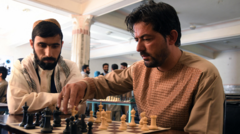In a controversial move, the Taliban government in Afghanistan has indefinitely suspended chess, with officials stating that the game may be associated with gambling, a practice deemed incompatible with Islamic law. The suspension comes at a time when the Taliban has been tightening its grip on various forms of entertainment, especially those accessible to young people.
Taliban sports spokesman Atal Mashwani articulated the concerns, saying, "Chess in Islamic sharia law is considered a means of gambling." He emphasized that the future of chess in Afghanistan hinges on addressing these religious considerations. This ban marks another chapter in the Taliban's ongoing efforts to impose their austere vision of Islamic law since they regained power in August 2021.
A local cafe owner in Kabul, Azizullah Gulzada, who has hosted informal chess tournaments over the past few years, expressed disappointment at the ban, highlighting that the game provided a much-needed social outlet for youth. "Young people don’t have a lot of activities these days, so many came here every day," he noted. "They would have a cup of tea and challenge their friends to a game of chess." He also pointed out that chess is widely enjoyed in other Muslim-majority countries, raising questions about the reasoning behind the ban.
This is not the first time the Taliban has restricted sports in Afghanistan. Last year, they banned mixed martial arts, describing the sport as too "violent" and inconsistent with Islamic principles. The government shut down MMA competitions shortly after taking power, citing concerns over "face-punching" and other elements they found troubling with respect to Sharia law.
As the Taliban continues to impose such regulations, the cultural landscape of Afghanistan's recreational activities becomes increasingly limited, particularly affecting the younger generation's social interactions and opportunities for engagement in traditional pastimes.
Taliban sports spokesman Atal Mashwani articulated the concerns, saying, "Chess in Islamic sharia law is considered a means of gambling." He emphasized that the future of chess in Afghanistan hinges on addressing these religious considerations. This ban marks another chapter in the Taliban's ongoing efforts to impose their austere vision of Islamic law since they regained power in August 2021.
A local cafe owner in Kabul, Azizullah Gulzada, who has hosted informal chess tournaments over the past few years, expressed disappointment at the ban, highlighting that the game provided a much-needed social outlet for youth. "Young people don’t have a lot of activities these days, so many came here every day," he noted. "They would have a cup of tea and challenge their friends to a game of chess." He also pointed out that chess is widely enjoyed in other Muslim-majority countries, raising questions about the reasoning behind the ban.
This is not the first time the Taliban has restricted sports in Afghanistan. Last year, they banned mixed martial arts, describing the sport as too "violent" and inconsistent with Islamic principles. The government shut down MMA competitions shortly after taking power, citing concerns over "face-punching" and other elements they found troubling with respect to Sharia law.
As the Taliban continues to impose such regulations, the cultural landscape of Afghanistan's recreational activities becomes increasingly limited, particularly affecting the younger generation's social interactions and opportunities for engagement in traditional pastimes.

















